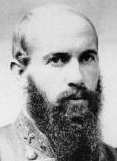 Open main menu
Open main menu
 Open main menu
Open main menu

HEADQUARTERS FOURTH BRIGADE,
November 14, 1862.
Major R. C. MORGAN.
I have the honor to submit the following report of the part taken by this brigade in the various engagements from Cedar Run to Shepherdstown, inclusive:
The report must necessarily be imperfect, as I was not in command of the brigade until after General Branch's fall, while most of the officers who commanded the different regiments are now absent, and did not leave with the assistant adjutant-general any account of the part taken in the various battles by their respective commands.
[Portions of report omitted here are in Series I, Vol. 12, Part 2, Pages 675-677]
HARPER'S FERRY.
The second day after the engagement at Ox Hill we marched through Leesburg, crossed the Potomac into Maryland on the 5th, and moved inn the direction of Frederick, where we remained several days. Then recrossed the Potomac at Williamsport, and marched on Harper's Ferry through Martinsburg. The evening of the 14th, we advanced down the Winchester and Harper's Ferry Railroad. The Seventh Regiment was in advance, and its skirmishers, commanded by Captain [John G.] Knox, succeeded in driving the enemy's sharpshooters from a high position overlooking the railroad. The remainder of the brigade reached this position after midnight, and there slept upon their arms until day, when every one was in readiness and awaited the orders to advance. After a short but rapid and well-directed artillery fire from our batteries, the enemy displayed several white flags, and we marched into the place without further resistance. We captured several prisoners the evening of the 14th. Our loss was 4 wounded.
SHARPSBURG.
We left Harper's Ferry on September 17, and, after a very rapid and fatiguing march, recrossed the Potomac and reached Sharpsburg in time to participate in the fight. The entire brigade was ordered to the right, and, on reaching the field, the Twenty-eighth was detached by General A. P. Hill, in person, and sent on the road to the left leading to Sharpsburg to repel the enemy's skirmishers, who were advancing through a field of corn. The rest of the brigade moved nearly at right angles to our line, and on the enemy's flank. The Thirty-third, Seventh, and Thirty seventh were the regiments principally engaged. They fought well, and assisted in driving back three separate and distinct columns of the enemy. The Eighteenth was not actively engaged. I was ordered, about sunset to rejoin the brigade, and on doing so ascertained that General Branch had been killed. It was after sunset when I assumed command of the brigade. I found the Seventh, Thirty-seventh, and Thirty-third posted behind a stone fence, and the Eighteenth sheltered in a hollow in rear. I ordered the Twenty-eighth to the left of the line, but the order was delivered to the Eighteenth, which was posted to the left behind a rail fence, a portion of it being broken back to guard against a flank movement. The Twenty-eighth was posted to the left of the Seventh, in the opening caused by the withdrawal of a few Georgia troops. Although annoyed by the enemy's sharpshooters, we held our position until ordered to fall back, on the night of the 18th. We did not cross the river until late next day. General Gregg's, General Archer's, and this brigade formed the rear guard of the army, and were kept in line, facing the enemy, until infantry, artillery, cavalry, wagons, and ambulances had all safely crossed.
Our loss in this engagement was our brigadier-general (L. O'B. Branch) killed, 20 others killed, 79 wounded, and 4 missing.
SHEPHERDSTOWN.
On the morning of September 20, we were moved with the balance of the division back to the ferry near Shepherdstown. Soon after we had taken our position in line in the field of corn in rear of the wheat-stacks, we were ordered to advance, in the face of a storm of round shot, shell, and grape. We moved forward in line until we reached General Pender's brigade, sheltered behind the hill in front of the residence near the ferry. Finding that he was outflanked on the left, we then moved by the left flank until we unmasked his brigade. The men, on reaching the top of the hill, raised a yell and poured a deadly fire into the enemy, who fled precipitately and in great confusion to the river. Advancing at a double-quick, we soon gained the bank of the river, and continued our destructive fire upon those who were attempting to regain the Maryland shore at the old dam just above the ferry. We held our position all that day immediately upon the bank of the river, though exposed to the heaviest cannonading of the war, and in range of the enemy's sharpshooters, who were posted in strong force on the Chesapeake and Ohio Canal. Our loss was 3 killed and 71 wounded.
Lieutenant-Colonel Purdie, who bravely, commanded the Eighteenth in most of these engagements, desires that special mention should be made of Captain John D. Barry, of Company I, for his coolness and gallantry and devotion to duty. Captains Turner and Knox, of the Seventh, have on all occasions, but especially as commanders of skirmishers, won the admiration of the entire brigade by their daring and efficiency. Lieutenants [W. W.] Cloninger and [G. W.] McCauley, of the Twenty-eighth, are also deserving special notice for their great bravery and faithfulness in the discharge of their duties.
Very respectfully,
JAMES H. LANE,
Brigadier-General.
Source: OFFICIAL RECORDS: Series 1, Vol 19, Part 1 (Antietam - Serial 27) , Pages 985 - 986